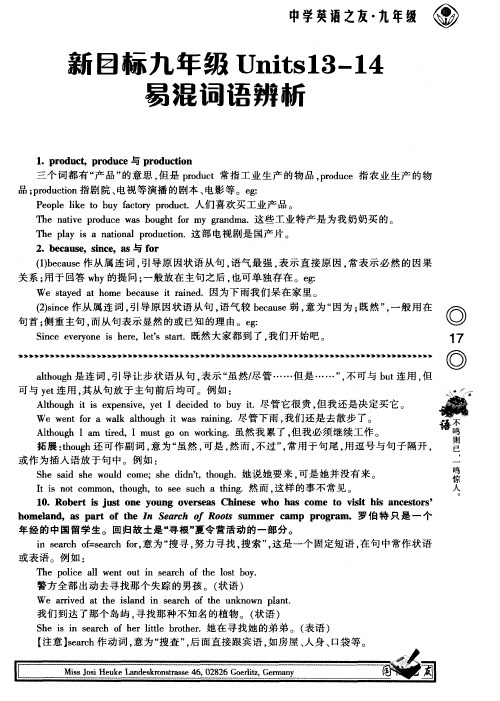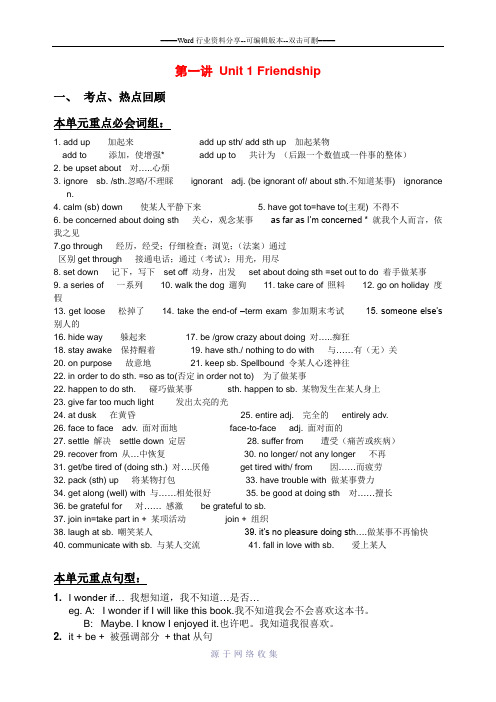Unit 1 重点词语辨析
- 格式:doc
- 大小:30.50 KB
- 文档页数:3

单元要点预览1.谚语:a friend in need is a friend indeed 患难见真情A friend is like a second self。
朋友是另一个自我。
一、短语归纳lought at 嘲笑 hide away 躲起来 a series of 一系列grow\be crazy about 对…十分狂热;十分痴迷something to do with与…有关的某事、 nothing to do with 与…无关happen to do sth 碰巧做某事 at dusk: 黄昏时刻傍晚face to face面对面 Take care of 照顾Walking the dog 遛狗(Pay for sth 为…付款Pack(sth)up将东西装箱打包Finish sth\doing sth完成某事、完成做某事 Stay awake 熬夜end-of-term exam 期末考 fall in love with 爱上according to 根据 make a list of 列清单二、。
词语辨析四.重点词汇1. upset adj。
心烦意乱的,不安的;不适的vt。
(upset, upset)Don’t upset yourself —— no harm has been done。
不要难过—-并没有造成伤害。
2. concern v。
担忧;涉及;关系到 n。
担心,关注;(利害)关系[重点用法]as / so far a s … be concerned 关于;至于;就……而言be concerned about 关心be concerned in sth. 牵涉到,与……有关,参与3。
settle vt. 安家;定居;停留 vt. 使定居,安家;解决1). The family has settled in Canada. 这家人已定居加拿大。
2)Try your best to calm yourself down..[重点用法]settle down 镇定下来 settle in 在…定居4。

人教版七年级英语下册Units 1-3词语辨析1. join, take part in【辨析】 join 和 take part in 都有“参加”的意思,多指参加某组织,成为其中的一个成员。
而take part in 指参加某种活动。
例如:I want to join the army. 我想要参军。
He is going to take part in an English evening tomorrow. 他将要明天参加一个英语晚会。
2.say, speak【辨析】 say 意为“说”,强调说的内容,而speak意为“讲”,后接某种语言。
例如:He wants to say something in the meeting. 他想在会上学些事情。
Can you speak English? No, I can’t. 你会讲英语吗?不,我不会。
3.also, too, eitheralso, too, either都表示“也”,also 和 too also, too,用于肯定句和疑问句,also用于句中,具体用在实义动词前,情态动词、系动词、助动词之后,而too用于句末。
either用于否定句,且用在句末。
例如:He can also speak English.他也能讲英语。
He can speak English,too. 他也能讲英语。
I don’t like playing basketball, either.我也不喜欢打篮球。
4.be good at , be good with , be good forbe good at 是指擅长做某事,后接名词、代词、动名词,而be good with 是指和某人相处得好,后接“人”. be good for 意为:“对……有益”,后接名词、代词、动名词。
He is good at telling stories. 他擅长讲故事。
I am good with old people. 我擅长和老人相处。

Unit 1 where did you go on vacation ➢单词复习:任何人Anywhere 精彩的;极好的最多的;大多数的没有什么n.没有。
每人;人人.我自己你自己;你亲自hen pig似乎;好像无聊的;厌烦的;郁闷的Someone Diary 活动;活跃。
决定;选定Paragliding bird bicycle building trader惊奇;想知道;怀疑差异;不同顶部;顶等;等待湿的;雨天的低于;在。
..下面饥饿的;渴望的如同;像.。
一样HillDuck不喜欢;厌恶短语归纳1、go on vacation去度假 ,2、stay at home 呆在家,3、go to the mountains 上山/进山,4、go to the beach到海边去,5、visit museums 参观博物馆,6、go to summer camp 去夏令营,7、quite a few 相当多,8、study for为……学习,9、go out 出去,10、most of the time 大部分时间/绝大多数时间,11、taste good 尝起来味道好,12、have a good time玩的开心,13、of course当然可以,14、feel like(doing sth)感觉像……/想要,15、go shopping购物,16、in the past 在过去,17、walk around绕……走,18、too many 太多(可数名词前面),19、because of 因为,20、one bowl of 一碗……,21、find out 查出来/发现,22、go on继续,23、take photos 照相,24、something important重要的事情,25、up and down上上下下,26、come up出来➢习惯用法、搭配1. buy sth。
for sb.=buy sb. sth。



第一讲Unit 1 Friendship一、考点、热点回顾本单元重点必会词组:1. add up 加起来add up sth/ add sth up 加起某物add to 添加,使增强* add up to 共计为(后跟一个数值或一件事的整体)2. be upset about 对…..心烦3. ignore sb. /sth.忽略/不理睬ignorant adj. (be ignorant of/ about sth.不知道某事) ignorancen.4. calm (sb) down 使某人平静下来5. have got to=have to(主观) 不得不6. be concerned about doing sth 关心,观念某事as far as I’m concerned * 就我个人而言,依我之见7.go through 经历,经受;仔细检查;浏览;(法案)通过区别get through 接通电话;通过(考试);用光,用尽8. set down 记下,写下set off 动身,出发set about doing sth =set out to do 着手做某事9. a series of 一系列10. walk the dog 遛狗11. take care of 照料12. go on holiday 度假13. get loose 松掉了14. take the end-of –term exam 参加期末考试15. someone else’s 别人的16. hide way 躲起来17. be /grow crazy about doing 对…..痴狂18. stay awake 保持醒着19. have sth./ nothing to do with 与……有(无)关20. on purpose 故意地21. keep sb. Spellbound 令某人心迷神往22. in order to do sth. =so as to(否定in order not to) 为了做某事22. happen to do sth. 碰巧做某事sth. happen to sb. 某物发生在某人身上23. give far too much light 发出太亮的光24. at dusk 在黄昏25. entire adj. 完全的entirely adv.26. face to face adv. 面对面地face-to-face adj. 面对面的27. settle 解决settle down 定居28. suffer from 遭受(痛苦或疾病)29. recover from 从…中恢复30. no longer/ not any longer 不再31. get/be tired of (doing sth.) 对….厌倦get tired with/ from 因……而疲劳32. pack (sth) up 将某物打包33. have trouble with 做某事费力34. get along (well) with 与……相处很好35. be good at doing sth 对……擅长36. be grateful for 对…… 感激be grateful to sb.37. join in=take part in + 某项活动join + 组织38. laugh at sb. 嘲笑某人39. it’s no pleasure doing sth….做某事不再愉快40. communicate with sb. 与某人交流41. fall in love with sb. 爱上某人本单元重点句型:1. I wonder if… 我想知道,我不知道…是否…eg.A: I wonder if I will like this book.我不知道我会不会喜欢这本书。
Unit 1 Where did you go on vacation?一、重点短语1. go on vacation 去度假2. go shopping 购物3. go out 外出(娱乐)4. buy sth. for sb.(= buy sb. sth.) 给某人买某物5. go to summer camp 去夏令营6. go to the beach 去海滩7. go to the mountains 去爬山8. keep a diary 记日记9. long time no see 好久不见10. most of the time 大多数时间11. study for tests 备考12. feed hens 喂母鸡13. quite a few 相当多;不少14. visit museums 参观博物馆15. visit my uncle 拜访我叔叔16. stay at home 待在家17. taste good 尝起来不错18. in the countryside 在乡下19. Bye for now!再见了!20. along the way 沿途21. another two hours( 另外两个小时22. because of 因为23. the next day 第二天24. feel like 给……的感觉;感受到25. find out 查明;弄清26. come up 升起27. in the past 在过去28. take photos 照相29. too many people太多的人30. try doing sth. 试着做某事31. walk around 四处走走32. arrive in(= get to) 到达33. walk up to the top 走到顶部34. rain hard 雨下得很大35. bring back 带回来36. jump up and down in excitement 兴奋地跳来跳去37. learn something important 学一些重要的东西38. have a fun time 玩得非常开心39. in the shopping center 在购物中心40. keep doing sth. 继续做某事二. 重点句型1. ——Where did you go on vacation? 你到哪里去度假了?——I went to New York City. 我去了纽约城。
牛津译林版八年级英语上册Unit1知识点讲解牛津译林版八年级英语上册Unit1知识点讲解重点单词清单1. thirsty /形adj.口渴的典例I'm so thirsty. Can I get something to drink?我如此口渴。
我可以要点儿喝的吗?拓展thirsty的比较级是thirstier, 最高级是thirstiest。
honest/形adj.诚实的;正直的助记诚实的猴[ ho(u) ]待在鸟巢( nest)里。
典例an honest boy一个诚实的男孩反义: dishonest adj.不诚实的,不正直的拓展honest是以元音音素开头的单词,前面用不定冠词an。
联想honesty n.诚实,正直secret /名n.秘密典例I can’t tell you that. It’s a secret.我不能告诉你那件事。
它是个秘密。
短语* keep a secret保守秘密in secret秘密地,暗地里拓展secret adj. 秘密的care/动vi.& vt.关心,关注,在意典例:I don't care much about going to the party.我不太在意去参加那个晚会。
短语>care for 照料;喜欢care about 关心;关怀联想care n. 照管;管理;看护;小心;留神take care of照料,关怀yourself /代pron.你自己助记your( pron.你的)+self(n.自己)= yourself典例Help yourself to some fish, Ann.安,请随便吃些鱼吧。
短语*enjoy yourself玩得开心by yourself独自地,独立地help yourself to... 请随便吃拓展yourself的复数形式为yourselves.6.magazine/n.杂志典例read many kinds of magazines拓展英语中“看”的不同表达(看书read a book看电影see/ watch a film看电视watch TV看黑板look at the blackboard看医生see the doctor看窗外look out of the window7. good-looking /形adj.好看的,漂亮的助记> good( adj.好的) +looking( adj.●.....相貌的)= good-looking典例>Lucy is a good-looking girl.露西是-个漂亮的姑娘。
考点汇编:Unit1 Topic1词语辨析1.you与your单词辨析例句you you是人称代词,可表示主格或宾格,在句中可作主语或宾语。
You are my cousin.你是我的堂兄your Your是形容词性物主代词,可以用来修饰名词。
What’s your name?你叫什么名字?单词辨析例句not与no not和no都有“不”的意思,但用法不同。
not是副词,常与be动词、助动词、情态动词等一起构成否定句,而no则可单独使用,它的反义词是yes,用于回答一般疑问句。
—He is not a student.他不是一个学生。
—Are you a student?你是一个学生吗?—No, I’m not.不,我不1是。
单词辨析例句Miss (小姐、女士)一般是对未婚女子的称呼,与姓氏连用。
Miss Brown is ourEnglish teacher.布朗小姐是我们的英语老师。
Mrs./Mrs (夫人、太太)是对已婚女性的称呼,常与丈夫姓氏连用。
Mrs. Smith lives inParis.史密斯太太住在巴黎。
Ms./Ms (小姐、女士)用在婚姻状况不明的女子姓名或姓氏前。
Mr. Smith looks young.史密斯女士看上去很年轻。
单词辨析例句2my my是形容词性物主代词,意思是“我的”,在句中作定语。
My pen is blue.我的钢笔是蓝色的。
I I是人称代词,意思是“我”,只能作主语,而且永远要大写。
I am a farmer.我是一个农民。
me me是I的宾格形式,一般放在动词或介词后,在句中作宾语。
Can you give me aruler?你能给我一把尺子吗?3。
新版八上英语辅导资料Unit 1 Where did you go on vacation?重点语法:一,一般过去时用法:表示过去某时发生的动作或状态。
以句中表示过去的时间状语作为标志词。
例如:否定句:____________________________________________________________一般疑问句: _____________________________________________________________特殊疑问句: ____________________________________________________________动词过去式变形:规则变化练习:1•用所给词的适当形式填空1.We ___________ (play)basketball yesterday afternoo n.2. My uncle ______________ (live) in Beiji ng in 2000.3. They __________ (pla n)to build a new bridge last year.4. I ___________ (study) for a test last ni ght.5. Lily ' s father __________ (work)in the office two years ago.,2.句型转换,1.1was late for school yesterday.(改成否定句)2.His father had lunch in his factory.(改成一般疑问句)3.They went to the mountains on vacati on.(改成否定句)4. A nn put her book in the desk just now.(划线部分提问)3.单项选择( )1. --- ___________ did you go on vacati on? ---Hong Kong.A. WhatB. HowC. WhereD. When( )2. I ________ m y homework last ni ght. I went to the cin ema with my pare nts.A. didB. didn ' tC. didn ' t doD. don ' t do( )3. ---Did they clea n the house yesterday after noon? --- __________ . They clea ned it this morni ng.A. No, they don ' tB. Yes, they didC. No, they didn ' tC. Yes, they do ( )4. --- ______ Tom and Jim _______ a walk yesterday evening? ---No, they _______ .A. Do; take; doesnB. Did; take; didnC. tDid; take; didD. Do; take; don 't ( )5. ---The coat looks good on you. Where ___________ y ou _________ it? ---I n a supermarket.A. do; buyB. did; buyC. will; buyD. does; buy二、复合不定代词用法:1,作主语时,谓语动词用单数Everyone _______________ (be) here.2,被形容词修饰时,形容词必须后置。
aloud 强调发出的声音能被听见,意为“出声地;大声地”,常与read, think, call 等动词连用,无比较级。
例如:Please read the text aloud. 请大声朗读课文。
She called aloud for help. 她高声地呼救。
loud 意为“响亮地;大声地”,侧重发出的音量大,传得远,一般多用来修饰speak, talk, laugh, shout, cry等动词,多用比较级。
loud还可用作形容词,在句中可作表语或定语。
例如:
Speak louder, please, or no one will hear you. 请大声些,否则没人能听见你的话。
He has a loud voice. 他嗓音很洪亮。
loudly 意为“大声地;高声地”,常与ring, knock 等动词连用。
loudly 放在动词前后均可,含有“喧闹”或“嘈杂”的意味。
例如:
Suddenly the bell on the wall rang loudly. 突然,墙上的铃大声地响起来。
Don’t talk so loudly, I’m listening to a story. 别大声说话,我在听故事。
II. noise; sound; voice
noise 指的是人们不愿意听到的“噪声”,意为“噪音;喧闹声;嘈杂声”,一般指令人不快的声音。
例如:
I hate the noise of the street, it makes me fed up. 我不喜欢街上的吵闹声,它让我厌烦。
Don’t make any noise in class. 别在课堂上吵闹!
sound 泛指大自然中能听到的各种“声音”。
例如:
We all heard the sound of a cry. 我们都听到了哭声。
Have you heard the strange sound from the next room? 你听到隔壁房间里发出的怪声音了吗?
voice 一般指人说话、唱歌或笑的声音。
例如:
The little girl has a beautiful voice. 这个小女孩有一副好嗓子。
The singer has lost her ringing voice. 这位歌手失去了银铃般的嗓音。
III. take part in; join; join in
take part in一般指“参加”群众性的活动、考试、竞赛、会议等,强调以主人公的态度参加,并起着应有的作用。
例如:Are you going to take part in the discussion? 你要参加讨论吗?
Many students took part in this math contest. 很多学生参加了这次数学竞赛。
join一般指“参加”某一组织、团体、党派、军队等,并成为其中的一员。
例如:
The old man joined the Party in 1948. 那位老人是1948年入
党的。
He is too young to join the army. 他太年轻还不能参军。
join in也有“参加;加入”的意思,后面接的宾语一般是表示竞赛、娱乐、游戏等活动的名词或V-ing形式;还可用于“join + 名词/ 代词+ in sth. / doing sth.”结构。
例如:Will you join us in a walk? 你愿意和我们一起去散步吗?All the people here join me in wishing you a Happy New Year. 这里所有的人和我一起祝你们新年快乐。
Can I join in the game? 我可以参加这个游戏吗?。